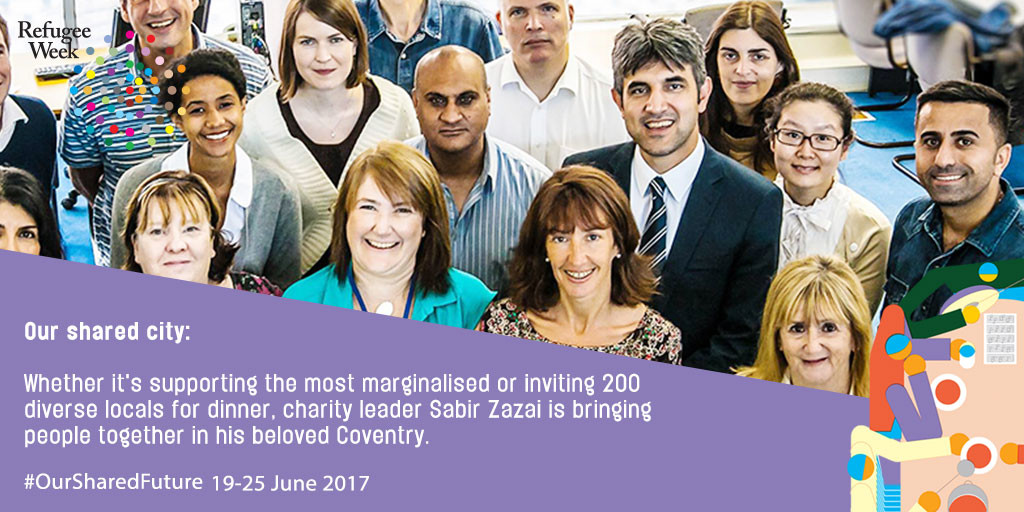As part of the Our Shared Future blog series, Marienna Pope-Weidemann meets charity leader Sabir Zazai, and learns about his journey from Afghan refugee to community pioneer
Great oaks grow from humble beginnings. When Sabir arrived in Coventry via Dover in 1999, the acorn was just three people from the community doing what they could. Coventry has a proud post-war history of welcoming refugees but Sabir’s was one of the first groups to arrive for many years. Their kindness and openness had a profound effect on him. “After enduring conflict in Afghanistan, which of course continues, and much danger on my journey, their hospitality and willingness to listen meant more to me than anything else they could have given,” he says. “I was separated from my family and my home, but meeting them I started to feel once more that I belonged.”
From there, the acorn began to take root. A year later, the volunteers moved into an old laundrette to create the then Coventry Refugee Centre . Twice a year the growing group would host celebrations at Coventry University. The first time Sabir arrived at the university, where he expected to find security guards he found an open campus. Meeting students inspired him to pursue his lifelong dream of going to university and in due course he completed a bachelors and masters degree from Coventry University.
Meanwhile, he had been volunteering at the centre. It quickly became apparent that someone the tree had grown to shelter would prove one of its strongest branches. Today, Sabir is the chief executive of the Coventry Refugee and Migrant Centre – but he gives all the credit to those who welcomed him in the early days. “My career is a real testament to how they worked: with us rather than for us, creating channels for us to give back to the community and build our confidence. When I came back to the charity as chief executive, I was managing the person who used to manage me as a volunteer! She was thrilled. This is what she had been working for. We were so proud of each other.”
Sabir is also chair of City of Sanctuary: a network of sanctuary buildings, campuses, villages and towns nationwide. But he’s not just concerned with refugee issues. He is also the vice-chair of Coventry Ethnic Minorities Action Partnership (CEMAP). Intended as a forum on integration, Sabir wanted it to serve the whole community instead. So, CEMAP has worked to build bridges between communities, hosting forums on topics chosen by local people, from welfare reform and housing to women’s issues. Sabir believes that creating such spaces allows people to see their challenges as shared and come together to find solutions.
For Sabir, what enabled him to thrive rather than just survive was the challenge of playing an active role in the life of the community. In this, he does not consider himself exceptional. Looking out his window each day at black cabs cruising past, he knows many of the drivers came from Afghanistan just like he did; that they are driving buses, teaching, nursing, giving back. Recently, a professional chef arrived in Coventry from Syria with his wife and young daughter. When he expressed his frustration not knowing how to show his thanks to the community for offering sanctuary, Sabir suggested he cook a Syrian meal for the community. 200 seats sold out in three days.
“Beyond protection, what all refugees ultimately want is the chance to make the unique contributions that only they can make,” says Sabir. “People aren’t just arriving with luggage, you know; they arrive with precious skills and experiences. When they’re supported in putting them to use, it demonstrates their resilience, their capacity for hope. And that enriches our society.”

In 2008 Sabir met and married his wife, who was soon living and working with him in Coventry. They have three children together, aged six, four and ten months. Sabir’s only complaint is that he doesn’t spend as much time with them as he’d like, given his many responsibilities. But, he says, at least his eldest daughter is old enough to understand what he’s doing. Last Christmas, she spontaneously made a Christmas card “to send to all the refugees”. There’s a proud smile in Sabir’s voice as he recalls that moment. “We turned it into our Christmas card, at least,” he says. “And she’s engaging already, drawing pictures, asking questions. ‘Why are some refugee children on their own?’ ‘Why can’t other countries do more to help?’” There are no easy answers to those questions, but she is proud to know her father is doing his part.
With Sabir’s leadership, Coventry’s refugee support network has grown from strength to strength and that tree, grown to protect a small community of newcomers, is now reaching its branches across the whole city, bringing people together beneath it. Yet Sabir’s proudest achievement – apart from his family – remains at the grassroots level. Every Tuesday, he takes time out to eat lunch with their support group for vulnerable and destitute men. “We eat together, play games and talk. And I see in their faces that meeting me gives them hope that they too can overcome these barriers in the asylum system and realise their potential. Travelling the country to chair meetings and speak on panels, these are great opportunities. But my proudest moments are those quiet conversations when I see people recover the courage to go on.”
When we ask Sabir what ‘Our Shared Future’ means to him, he laughs softly. “Well, it’s all about the journey, isn’t it? The future is always ahead; here and now, we’re on a shared journey. Whether we arrived weeks, years or generations ago, we’re on the same path. Wars and crises end, but the journey never does. Our children, befriending and connecting more broadly than we did, and our efforts to make the future welcoming to them all, that’s what a shared future means to me.”
